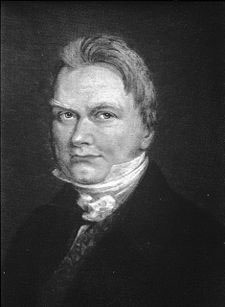1902 Encyclopedia > Jöns Jakob Berzelius
Jöns Jakob Berzelius
Swedish chemist
(1779-1848)
JONS JAKOB BERZELIUS, one of the most illustrious of modern chemists, was born on the 20th of August 1779, at a farm near Wafversunda, in Ostergötland, Sweden.
At the age of nine he was left an orphan in the charge of his stepfather, A. Elmark of Ekeby, a learned and amiable man, gifted, too, it would seem, with some prophetic insight, for one day he said to the child, "Jakob, I think you will tread in the footsteps of Linnaeus, or be another Cartouche! " From that day a desire for distinction as a man of science awoke in the child's breast.

Jöns Jakob Berzelius
In 1793 Berzelius entered the gymnasium school at Linkoping, where he made rapid progress. During his holidays, spent in the country, he met a man who instructed him in the elements of entomology, and thus gave a fresh impetus to his scientific proclivities. The latter soon developed into a passion, and under Hornstedt at Linkoping progressed rapidly till he left the college in 1796, and proceeded to the University of Upsala.
In 1798 he began to study chemistry under Professor Afzelius; and although in those days the lectures were without practical experiments and extremely uninteresting, he became more and more absorbed in the study.
In 1800 he was called to Stockholm as assistant to the royal physician, Dr Hedin, and his success as a practical chemist began. The Italian, Volta, had in 1800 invented the galvanic battery which bears his name; and Berzelius was one of the first persons in Europe to observe the greatness of this discovery. In 1802 he published a treatise on the subject.
In 1803 he became professor of physics, and by his lectures rapidly founded a new, a rational school of physiology, and threw new light on many difficult points connected with the chemical and physical characteristics of animal life. In the same year he published his Essay on the Division of Salts through Galvanism, in which he propounds the electro-chemical theory, the honour of first laying down which is divided between Berzelius and Davy.
In conjunction with Hisinger, Berzelius then published in numbers Treatises on Physics, Chemistry, and Mineralogy, a work of the greatest value for science. Honour after honour was heaped upon him ; in 1810 he was called to be a member of the Medical College of Sweden ; in 1808 he was elected president of the Academy of Sciences. Two years later he brought out his famous treatise On the Fixed Proportions and Weights of Atoms.
He then took up mineralogy with special ardour, and published his Treatise on the Blowpipe, he set up for himself a regularly graduated chemical system of minerals, and the value of this was felt to be so great that the Royal Society of London voted him its gold medal for it.
After incessant labour he retired, in 1832, from his professorship at Stockholm, having never been connected as teacher with any of the universities.
In 1842, while he was engaged in a chemical experiment, an explosion took place and he was much injured, but recovered and continued to work on till the close of his days. He died August 7, 1848. After Linnaeus, his is considered to be the greatest name in, science of which Sweden can boast. [--]
|
